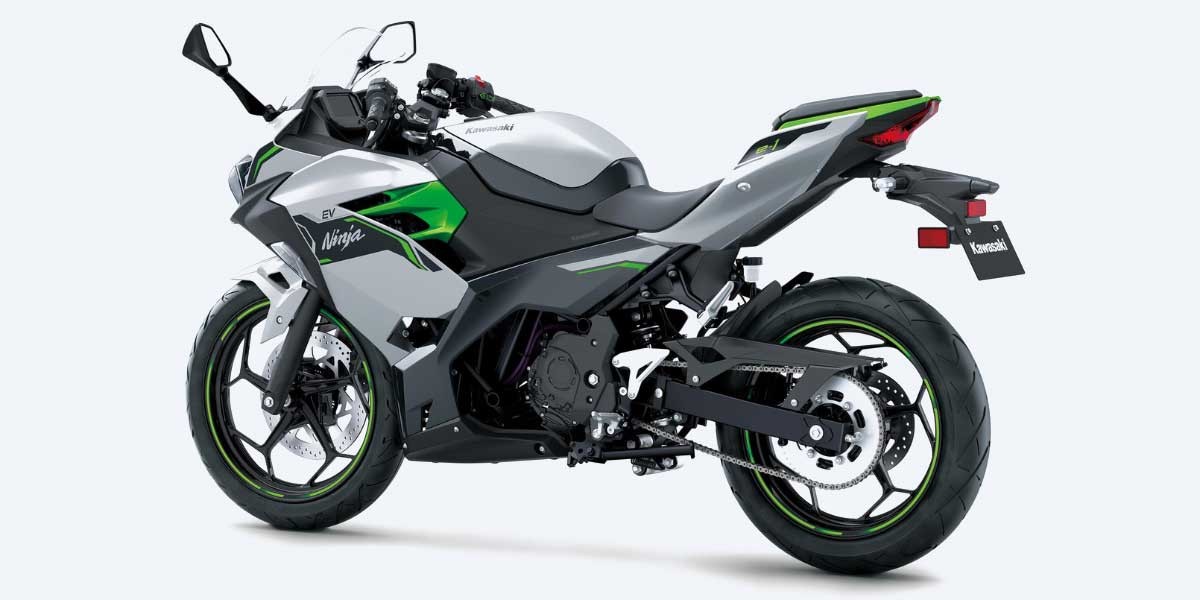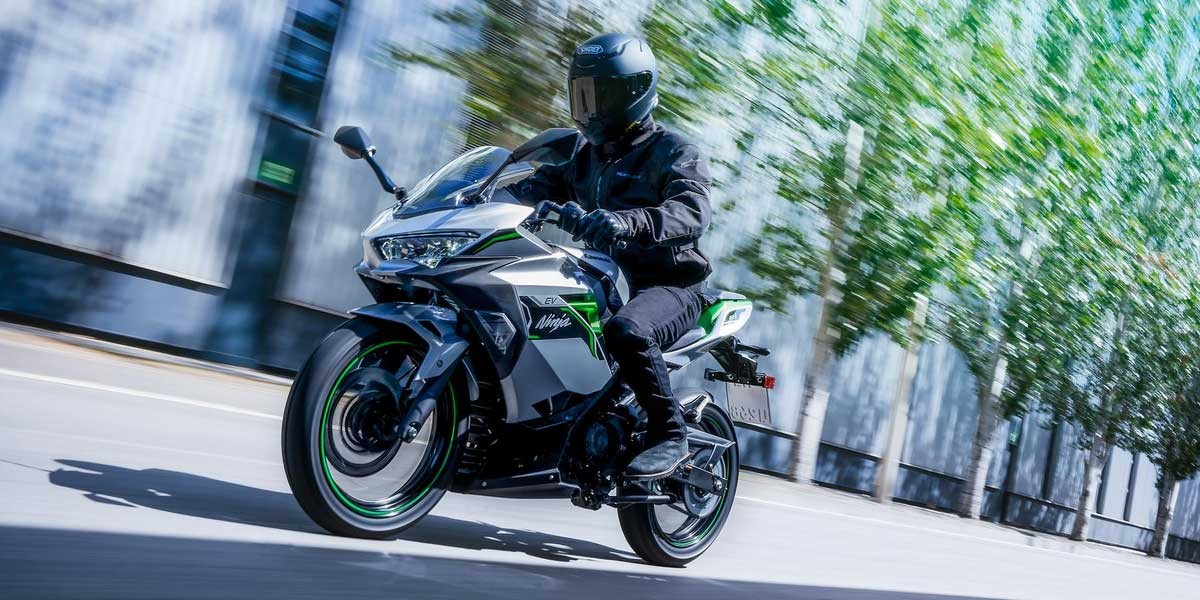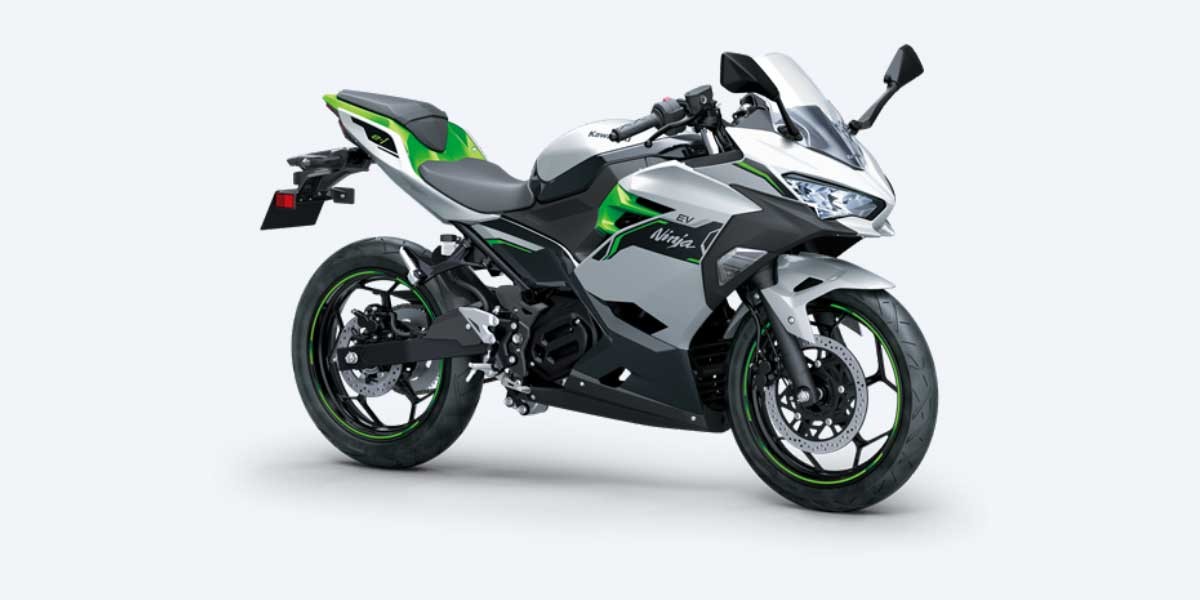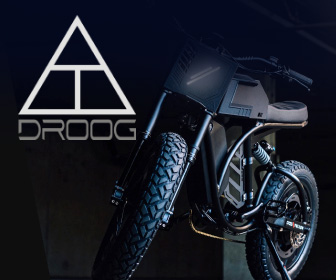Kawasaki Ninja e-1
Kawasaki Ninja e-1 is an electric motorcycle combining sportbike performance with zero emissions. Its sleek design, advanced electronics, and instant torque offer an exhilarating riding experience. The bike boasts quick acceleration, efficient power distribution, and a silent, environmentally-friendly ride.
User Rating: 4 / 5 (70 votes)





Base Trim Price: $7599 USD *
| manufactured in | Japan |
| motorcycle type | City Bike |
| model year | 2024 |
| range (km) | 66 |
| max. speed | 82 |
| transmission | chain |
| battery (kWh) | 3 |
| 0 to 100 km/h (sec) | no data |
| power (h.p.) | 12 |
* Minimum price set for the base trim by the manufacturer
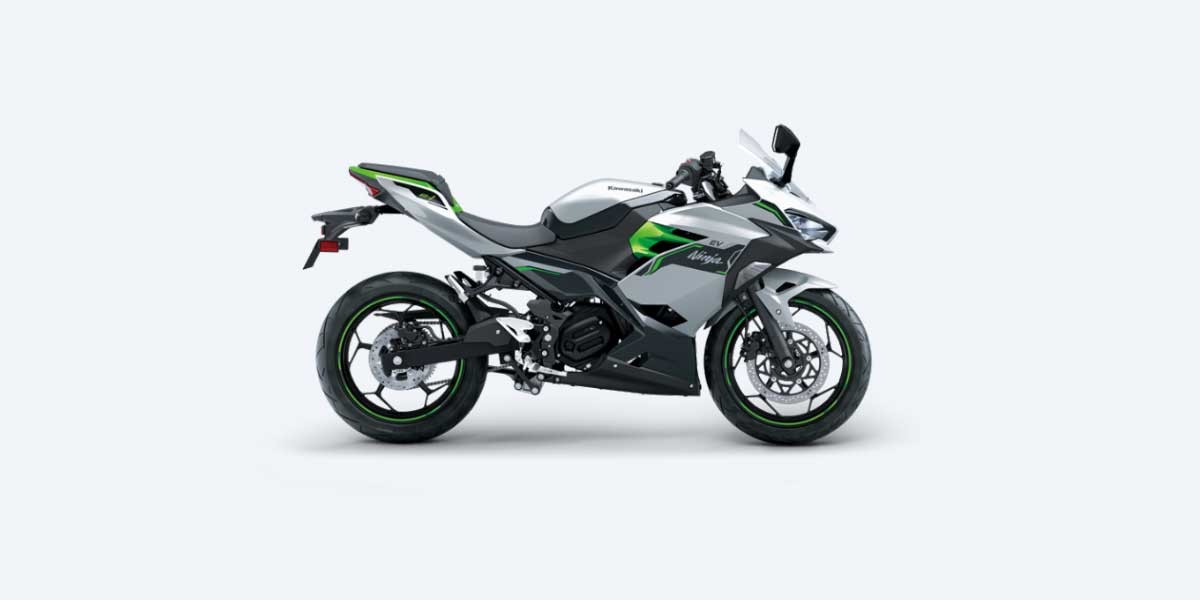
Kawasaki Ninja e-1 Review
Kawasaki Ninja e-1: Urban Electric Mobility Redefined
Stepping into the electrified domain, the illustrious Kawasaki has unfurled its green flag with the Ninja e-1. This marvel on two wheels is geared towards city slickers who pine for the verdant path of eco-friendliness without giving the cold shoulder to zestful performance.
Power and Performance
Loaded with a brushless electric motor, the Ninja e-1 bellows out an output of 5.0kW, peaking at a hearty 9.0kW. An incarnation of electric finesse, this motor is fine-tuned for immediate throttle response coupled with muscular power from the get-go — a boon in the hustle and bustle of urban sprawl.
The ingenious fusion of the single-ratio transmission with the motor bids adieu to the needs for a clutch or shift lever, drawing the curtains on traditional biking complexities.
Battery and Charging
A duo of lithium-ion battalions, snug beneath a storage chest traditionally reserved for a fuel tank, empowers the Ninja e-1. Each detachable battery, tipping the scales at 25.3 pounds, boasts a 30Ah capacity with a nominal voltage of 50.4V, accumulating a formidable battery capacity of 60Ah.
Kawasaki extols the simplicity of the battery extraction process, a godsend for homesteads bereft of garages, ensuring a charging process as breezy as a swivel in a dance.
Charging the steed is a tale of flexibility:
- With a charging dock
- Forgoing a charging dock
- Via an underseat charging adapter with the batteries snugly in place
Total replenishment of zeal takes 7.4 hours, or 3.7 hours per battery, with a sprint from 20% to 85% vigor achievable in about 1.6 hours for each battery.
Regenerative Braking and Riding Modes
Thanks to regenerative braking, slowing down transmutes into an act of conserving energy, funneling it back into the battery’s reservoir. This alchemy takes center stage when the charge levels descend below 60%, dwindling as they approach a replete state.
In its arsenal, the Ninja e-1 wields two riding modes: Road and Eco. The speed limit toggles based on the chosen mode, with Road thundering up to 52 mph and Eco modestly capping at 37 mph. A safeguard plunges the bike into “limited-power operation” once the battery's vitality wanes below 35%.
E-Boost for an Extra Push
An e-boost feature, evocative of a knight’s lance in a jouster’s grip, punctuates the Ninja e-1’s repertoire. It propels riders with heightened acceleration and velocities at the nudge of a button—albeit restrained to a 15-second interval to shepherd the battery’s longevity and thermal equilibrium. With e-boost activated, velocities escalate to 65 mph in Road mode and 45 mph in Eco mode.
The Kawasaki Ninja e-1 emerges as a shoestring to tie the expectations of urban riders yearning for an electric avenue. Sailing under the esteemed Kawasaki banner, it's an electric steed that promises both sustainable commuting and pulse-raising escapades through concrete jungles.
With the Ninja e-1, Kawasaki unfurls an overture to metropolitan adventurers, beckoning them towards a rendezvous with electrifying momentum and green gusto. It's a clarion call to dash through the cityscape, fueled by volts and valor.
Watch the Video Overview
Full Specifications List:
| Distance | Unknown |
| Speed | Unknown |
| Acceleration | Unknown |
| Power | Unknown |
| Battery Capacity | Unknown |
| Battery Charge | Unknown |
| Price | $7599, €7200, £6290 |
F.A.Q. about Kawasaki Ninja e-1
What is the range of an electric motorcycle?
The Kawasaki Ninja e-1 has a range of approximately 50-60 miles (80-97 kilometers) on a single charge, depending on riding conditions and speed.
How long does it take to charge an electric motorcycle?
The Kawasaki Ninja e-1 takes about 6 hours to fully charge using a standard home charger and around 2 hours with a fast charger.
How much does an electric motorcycle cost?
The Kawasaki Ninja e-1 is priced at $7,599. This is roughly €7,054 or £5,844, depending on the current exchange rates.
What are the best electric motorcycle brands?
Some of the top electric motorcycle brands include Zero Motorcycles, Energica, Harley-Davidson LiveWire, and of course, Kawasaki with the Ninja e-1 model.
How does an electric motorcycle compare to a gas motorcycle?
Electric motorcycles like the Kawasaki Ninja e-1 are quieter, have instant torque, and require less maintenance compared to gas motorcycles. However, they usually have a shorter range and longer refueling time.
What are the maintenance requirements for an electric motorcycle?
The Kawasaki Ninja e-1 requires less maintenance than a gas motorcycle. There are no oil changes or complex engine parts, but you will need to monitor the battery and electric components.
Are there any government incentives or tax credits for buying an electric motorcycle?
In many regions, electric motorcycles like the Kawasaki Ninja e-1 are eligible for government incentives and tax credits. These benefits vary by country and state.
What is the top speed of an electric motorcycle?
The Kawasaki Ninja e-1 has a top speed of around 62 mph (100 km/h), making it suitable for both city commutes and light recreational use.
Where can I find charging stations for my electric motorcycle?
Charging stations are commonly found at public parking spaces, shopping centers, and along highways. There are various apps and websites that can help locate charging stations for the Kawasaki Ninja e-1.
How long does the battery last on an electric motorcycle?
The battery life of the Kawasaki Ninja e-1 typically lasts around 5-8 years or 1,000 full charge cycles, depending on usage and maintenance.
Comparison:
Speed
The Kawasaki Ninja e-1 manages a top speed of approximately 100 mph (160 km/h). This places it well within the spirited performance sphere, but a bit behind the beastly Harley-Davidson LiveWire One, which roars up to 110 mph (177 km/h). The Zero SR/F blitzes through with a top rate of 124 mph (200 km/h), leaving others huffing fumes. Not far behind, the Energica Eva Ribelle peaks at 125 mph (201 km/h), making it a serious contender. Meanwhile, the more urban-oriented BMW CE 04 caps at a modest 75 mph (120 km/h), making it the stately commuter amidst these thrill-seekers.
Range
Range anxiety? Not with the likes of these machines. The Kawasaki Ninja e-1 offers a solid 100 miles (160 km) range on a single charge, which aligns it closely with the Harley-Davidson LiveWire One and its 105 miles (169 km) range. However, the Zero SR/F seizes the day with an eye-popping 161 miles (259 km) in city conditions. The Energica Eva Ribelle promises a hearty 143 miles (230 km), hovering above the Kawasaki. The BMW CE 04, crafted more for urban escapades, delivers 80 miles (129 km).
Power
The heart of these beauties, the powerplant. Kawasaki Ninja e-1 kicks out a respectable 20 kW (27 hp), enough to zip through city streets with gusto. On the other hand, the Harley-Davidson LiveWire One flexes an impressive 78 kW (105 hp). Yet, the supreme fire-breather here is the Zero SR/F with a titanic 82 kW (110 hp). Not to be outdone, the Energica Eva Ribelle belts out 107 kW (145 hp), edging out the Zero. The BMW CE 04 rounds off the pack with a commendable 31 kW (42 hp).
Charging Time
In the age of instant gratification, charging time is crucial. The Kawasaki Ninja e-1 recharges to 100% in about 4 hours, par for the course. The Harley-Davidson LiveWire One accelerates this process with a 1-hour rapid DC charge. Meanwhile, the Zero SR/F boasts a nimble 1.5-hour rapid charge option. The Energica Eva Ribelle impresses with just over an hour to full charge using a Level 3 charger. The BMW CE 04 comfortably pops back to life in around 4 hours using standard charging methods.
Price
Wallets at the ready. The Kawasaki Ninja e-1 is arguably the most pocket-friendly, retailing at approximately $7599, £5599, or €6499. Steeper on the spectrum, the Harley-Davidson LiveWire One commands a princely $21,999, £19,795, or €22,990. Equally elite, the Zero SR/F holds its own at $20,495, £17,990, or €19,990. The Energica Eva Ribelle ascends further, priced at $23,000, £20,480, or €24,890. Finally, the more commuter-centric BMW CE 04 enters at $11,795, £11,700, or €12,960.

